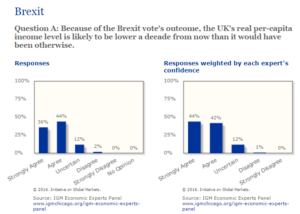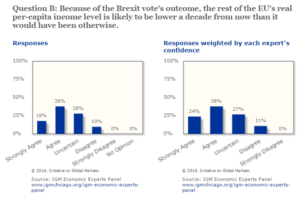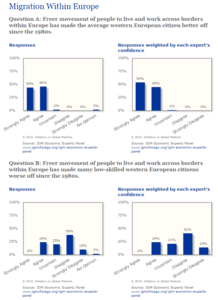How should Europeans respond to the powerful economic forces and the daunting policy challenges they face? Among voters, policy makers and pundits across the region, views differ widely: both over what has been happening in Europe’s economies and over what will happen if different approaches are tried. To support this debate, Chicago Booth’s Initiative on Global Markets has assembled a panel of leading European economic experts.
The panel’s goal is to explore the experts’ views on some of the most important policy questions facing the region – about issues such as trade, migration, taxes, banks, markets, and competition – and to share these views directly with the public in a simple way.
Consisting of 50 economists from 27 major universities and business schools, the European IGM Economic Experts Panel is composed entirely of top researchers. Panelists include Olivier Blanchard, former chief economist for the International Monetary Fund; Nobel laureate Christopher Pissarides; and faculty from an array of schools such as Bocconi University, the University of Zurich, the London School of Economics, and Chicago Booth. The four Booth faculty members are: Veronica Guerrieri, Christian Leuz, Lubos Pastor, and Canice Prendergast.
In launching the panel, the IGM asked the European experts about six initial topics, ranging from Brexit to the effects of tax competition to privatization in Eastern and Central Europe.
On Brexit, the experts were asked about the likely effects of Britain’s proposed departure on both the UK and the EU. Fully 80% of respondents believe that the Brexit decision will in 10 years leave real per-capita incomes in the UK lower than they otherwise would have been.
“Limiting trade reduces growth, especially when there are no nascent industries that could generate some long term externalities,” wrote Xavier Freixas of Universitat Pompeu Fabra.
Richard William Blundell of University College London added that “the tariff-free single market across Europe, together with the integration of [a] skilled labor market, adds significantly to UK real income.”
For the rest of the EU, views on Brexit’s likely effects were more mixed, though 56% expect real per-capita incomes a decade from now to be lower than they otherwise would have been. The panelists’ responses highlight the various channels – some positive, others negative—through which weakening ties with Britain could affect the EU.
Besides direct economic effects, for example, several panelists warned about potential negative effects on EU policymaking.
“EU lost [a] force for more open and flexible markets” wrote Chicago Booth’s Christian Leuz. Luigi Guiso of the Einaudi Institute for Economics and Finance echoed those concerns: “UK exit weakens the support for pro-market policies in the EU altering the balance of powers towards more state-oriented policies.” And Patrick Honohan of Trinity College Dublin—Governor of the Central Bank of Ireland from 2009-2015—added that “Brexit negotiations will sap energy and divert attention from other pressing problems.”
While British and EU leaders ponder pathways to separation, and while voters in other countries debate the merits of an integrated Europe, the IGM’s panelists also weighed in on how free trade and migration within Europe have affected the economic well being of Western Europeans.
The experts were nearly unanimous in their sentiment that “freer movement of people to live and work across borders within Europe has made the average European citizen better off since the 1980s,” with 90% of the panel agreeing. Opinions were more divided on how that movement has affected low-skilled Western Europeans: a quarter of the panel said that freer movement had left many low-skilled workers worse off.
In response to a companion pair of questions about free movement of goods and services, the panelists expressed a similar range of views: 92% said it was good for the average person in Western Europe, and 22% said it was not good for many low-skilled workers in those countries.
The results of all six inaugural polls of the European panel are available on the IGM Forum website, which also hosts responses from its US-based panel of experts (which it has been running since 2011). The IGM launched the panels as part of its mission to inform the public about important ideas while “bringing Booth’s spirit of excellence in research and inquiry to markets, institutions and policies”.
The IGM plans to poll the European panel on a new topic every few weeks.




